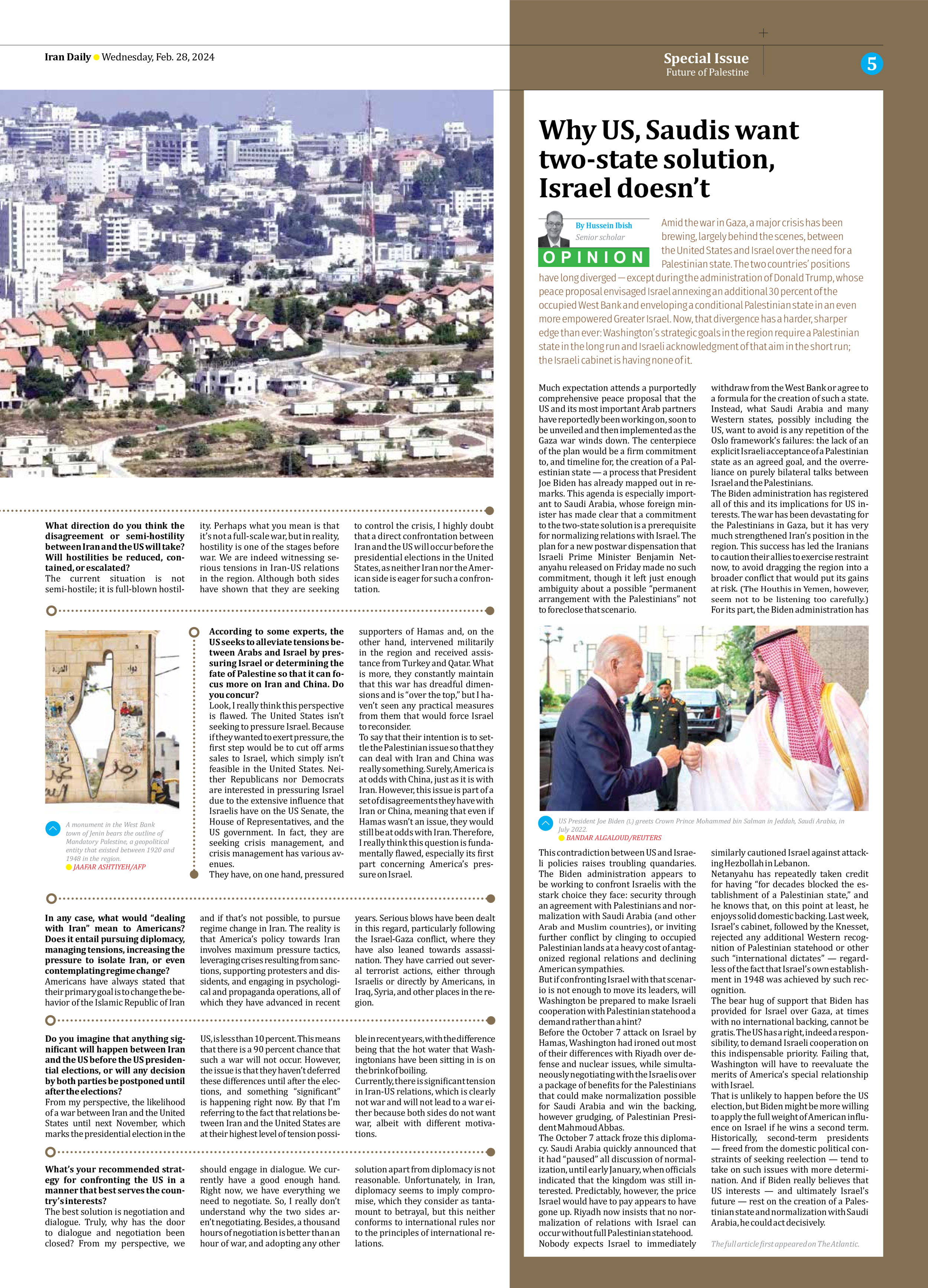
Why US, Saudis want two-state solution, Israel doesn’t
By Hussein Ibish
Senior scholar
Amid the war in Gaza, a major crisis has been brewing, largely behind the scenes, between the United States and Israel over the need for a Palestinian state. The two countries’ positions have long diverged — except during the administration of Donald Trump, whose peace proposal envisaged Israel annexing an additional 30 percent of the occupied West Bank and enveloping a conditional Palestinian state in an even more empowered Greater Israel. Now, that divergence has a harder, sharper edge than ever: Washington’s strategic goals in the region require a Palestinian state in the long run and Israeli acknowledgment of that aim in the short run; the Israeli cabinet is having none of it.
Much expectation attends a purportedly comprehensive peace proposal that the US and its most important Arab partners have reportedly been working on, soon to be unveiled and then implemented as the Gaza war winds down. The centerpiece of the plan would be a firm commitment to, and timeline for, the creation of a Palestinian state — a process that President Joe Biden has already mapped out in remarks. This agenda is especially important to Saudi Arabia, whose foreign minister has made clear that a commitment to the two-state solution is a prerequisite for normalizing relations with Israel. The plan for a new postwar dispensation that Israeli Prime Minister Benjamin Netanyahu released on Friday made no such commitment, though it left just enough ambiguity about a possible “permanent arrangement with the Palestinians” not to foreclose that scenario.
This contradiction between US and Israeli policies raises troubling quandaries. The Biden administration appears to be working to confront Israelis with the stark choice they face: security through an agreement with Palestinians and normalization with Saudi Arabia (and other Arab and Muslim countries), or inviting further conflict by clinging to occupied Palestinian lands at a heavy cost of antagonized regional relations and declining American sympathies.
But if confronting Israel with that scenario is not enough to move its leaders, will Washington be prepared to make Israeli cooperation with Palestinian statehood a demand rather than a hint?
Before the October 7 attack on Israel by Hamas, Washington had ironed out most of their differences with Riyadh over defense and nuclear issues, while simultaneously negotiating with the Israelis over a package of benefits for the Palestinians that could make normalization possible for Saudi Arabia and win the backing, however grudging, of Palestinian President Mahmoud Abbas.
The October 7 attack froze this diplomacy. Saudi Arabia quickly announced that it had “paused” all discussion of normalization, until early January, when officials indicated that the kingdom was still interested. Predictably, however, the price Israel would have to pay appears to have gone up. Riyadh now insists that no normalization of relations with Israel can occur without full Palestinian statehood.
Nobody expects Israel to immediately withdraw from the West Bank or agree to a formula for the creation of such a state. Instead, what Saudi Arabia and many Western states, possibly including the US, want to avoid is any repetition of the Oslo framework’s failures: the lack of an explicit Israeli acceptance of a Palestinian state as an agreed goal, and the overreliance on purely bilateral talks between Israel and the Palestinians.
The Biden administration has registered all of this and its implications for US interests. The war has been devastating for the Palestinians in Gaza, but it has very much strengthened Iran’s position in the region. This success has led the Iranians to caution their allies to exercise restraint now, to avoid dragging the region into a broader conflict that would put its gains at risk. (The Houthis in Yemen, however, seem not to be listening too carefully.) For its part, the Biden administration has similarly cautioned Israel against attacking Hezbollah in Lebanon.
Netanyahu has repeatedly taken credit for having “for decades blocked the establishment of a Palestinian state,” and he knows that, on this point at least, he enjoys solid domestic backing. Last week, Israel’s cabinet, followed by the Knesset, rejected any additional Western recognition of Palestinian statehood or other such “international dictates” — regardless of the fact that Israel’s own establishment in 1948 was achieved by such recognition.
The bear hug of support that Biden has provided for Israel over Gaza, at times with no international backing, cannot be gratis. The US has a right, indeed a responsibility, to demand Israeli cooperation on this indispensable priority. Failing that, Washington will have to reevaluate the merits of America’s special relationship with Israel.
That is unlikely to happen before the US election, but Biden might be more willing to apply the full weight of American influence on Israel if he wins a second term. Historically, second-term presidents — freed from the domestic political constraints of seeking reelection — tend to take on such issues with more determination. And if Biden really believes that US interests — and ultimately Israel’s future — rest on the creation of a Palestinian state and normalization with Saudi Arabia, he could act decisively.
The full article first appeared on The Atlantic.







